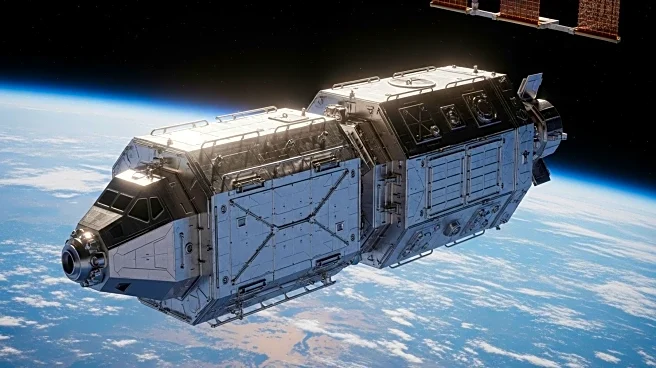What's Happening?
Northrop Grumman is set to launch its Cygnus XL freighter to the International Space Station (ISS) on September 14, marking a significant upgrade in cargo capacity. The Cygnus XL, with twice the cargo capacity of its predecessor, will lift off aboard a SpaceX Falcon 9 rocket from Cape Canaveral. This mission, part of the Commercial Resupply Services 23 (CRS-23), follows 22 previous Cygnus missions since 2013. The new freighter can carry 11,023 pounds to the ISS, doubling the previous capacity. Northrop Grumman is also developing a version of Cygnus that can autonomously dock, enhancing future commercial station servicing capabilities. The Cygnus XL launch will be followed by Japan's HTV-X cargo ship debut, designed for post-ISS missions, and Sierra Space's Dream Chaser spaceplane, which is yet to be rescheduled for launch.
Why It's Important?
The expansion of the ISS cargo resupply fleet with the Cygnus XL and other new vehicles is crucial for maintaining and enhancing the station's operations. The increased cargo capacity supports more extensive scientific research and technological experiments aboard the ISS. The development of autonomous docking technology by Northrop Grumman is significant for future commercial space stations, potentially reducing reliance on manual operations and increasing efficiency. The introduction of Japan's HTV-X and Sierra Space's Dream Chaser further diversifies the fleet, ensuring robust support for the ISS and future space exploration missions, including the U.S.-led Artemis lunar program.
What's Next?
Following the Cygnus XL launch, Japan's HTV-X cargo ship is expected to debut this fall, supporting both ISS resupply and future commercial stations. Sierra Space's Dream Chaser is anticipated to join the fleet once its launch schedule is finalized. These developments are part of a broader strategy to transition from the ISS to commercially owned and operated outposts in low Earth orbit, paving the way for new business opportunities in space logistics and exploration.
Beyond the Headlines
The diversification of the ISS cargo fleet reflects a growing trend towards international collaboration and commercial involvement in space exploration. This shift may lead to increased competition and innovation in the space industry, driving advancements in technology and reducing costs. The focus on autonomous docking and reusable spacecraft highlights the industry's move towards sustainable and efficient space operations, which could have long-term implications for global space policy and commercial ventures.










